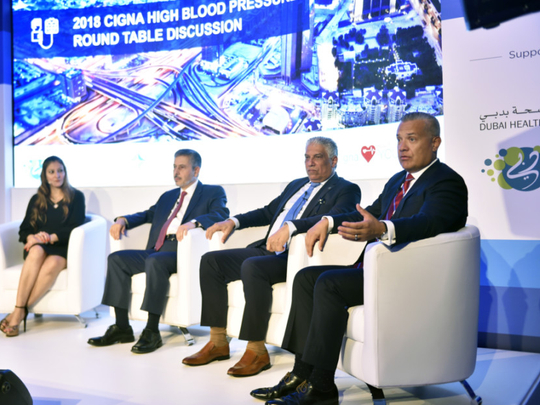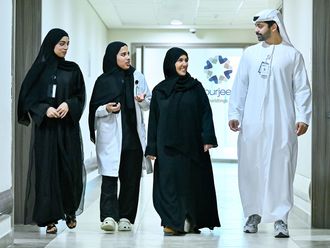
Dubai: A new study on Tuesday revealed that almost half of the UAE’s population harbours misconceptions about the risks of high blood pressure.
The study conducted by Cigna Insurance Middle East concluded that 44 per cent of residents believe that the condition is not potentially fatal.
It surveyed 1,004 respondents over the age of 18 across social groups in the UAE through an online questionnaire in August.
The findings presented on Tuesday showed that close to half of the respondents (47 per cent) who do not suffer from high blood pressure were "unaware of its symptoms".
This statistic is particularly high among the Emirati population (62 per cent) and those in the age group of 18-24 years (58 per cent).
Earlier this month, health officials quoting three separate studies said around 30 per cent of adults in the UAE have high blood pressure and the prevalence could increase with time.
Known as ‘the silent killer’, blood pressure often leads to heart diseases blamed for 30 per cent of deaths in Dubai.
“Although individuals over 40 years-old are identified as having a higher propensity for high blood pressure [HBP], preventative measures and early detection is essential from as early as 18 years of age,” said Dr Mohammad Farghaly, senior specialist of family medicine and head of insurance medical regulation at the Dubai Health Authority (DHA).
The findings show that 16 per cent of respondents have never been checked for HBP (27 per cent in the 18-24 age group and 26 per cent Arab expats), and close to 50 per cent cited ‘not having any symptoms’ as a predominant reason for not being screened.
Heart your heart campaign
Following the survey, a new health campaign titled "Heart your heart" was launched with the aim of driving awareness about the risks and prevention of heart diseases.
The campaign will be carried out in phases over three years by initiating a dialogue on policy and regulation and driving behavioural change about heart health. The goal is to ultimately create an impactful outcome as a result of educating the public and medical fraternity.
In phase one, the campaign will raise awareness about HBP through a range of outreach efforts.
“Our plan is to reach all residents across UAE with a message that proactive screening to identify the disease as soon as possible is the first step,” said Jason Sadler, president of Cigna International Markets.
He pointed out that campaign will provide educational outreach to patients already living with the condition and to their family members as well as the medical community. It will also work together with the DHA to provide educational sessions to physicians and providers to help them better identify some of the higher risk subjects.
“A World Health Organisation study tells us that 50 per cent of females with cardiovascular diseases in the region will die before the age of 60- that is both frightening and alarming,” said Sadler.
Prevention
Discussing causes and treatment options for HBP, Dr Omar Hallak, consultant interventional cardiologist at the American Hospital in Dubai, referred to high stress, family history, weight and physically inactivity, as the highest contributing factors for HBP.
He pointed out that nearly 69 per cent of people who have their first heart attack are found to have a history of HBP.
“When we diagnose a patient we try to identify any underlining causes that are fixable such as a hormone abnormality or a vascular issue. However, for the vast majority of patients we don’t find an obvious reason- we diagnose the cause as idiopathic or genetic and most likely it’s the later,” he said.
Dr Hallak explained that physicians initially recommend that patients work on lifestyle improvement by eating healthy, exercising regularly, cutting down on caffeine, stopping smoking, avoiding alcohol, and getting enough hours of sleep each night.
“Life style management has helped to reduce blood pressure in a significant number of patients, however, if it doesn’t, then lifelong medication is needed,” he added.












